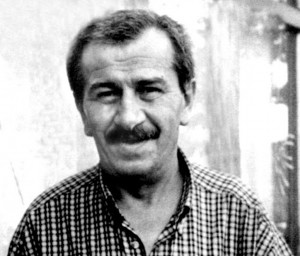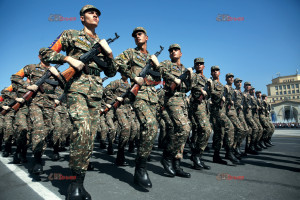Հայերեն | На русском | In English

 Until five days ago, before learning the trade of a shoemaker, we studied the trade of a soldier, long before wearing the cloak of an academician, we wore the uniform of a soldier, we took a military oath long before we took the presidential oath.
Until five days ago, before learning the trade of a shoemaker, we studied the trade of a soldier, long before wearing the cloak of an academician, we wore the uniform of a soldier, we took a military oath long before we took the presidential oath.
First of all and in the beginning we were soldiers.
After learning the trade of a shoemaker, we remained soldiers, after wearing the cloak of an academician, we were soldiers again, after taking the presidential oath, we were soldiers again.
After all and finally we were soldiers and we did not know about it.
We were always soldiers, out of time, beyond time, we were always soldiers. This was our destiny, we were doomed like that. It is difficult to say whether it was a blessing or a curse. God cursed Adam and condemned him to work, and Adam, who was planted in the garden like an apple and the size of a fig tree, wiped the sweat from his brow, appreciated himself, and was saved. The same God, cursing the same Adam, condemned him to freedom, and Adam, who was planted in paradise like a fig tree and the size of an apple tree, covered his shame, knew Eve, realized himself and became a man. God himself does not understand in confusion what to do. “Take it, leave it, what is good, what defines it, this or that?” That’s it.
And that soldier, who we were, because he was out of time until five days ago, could not find his battle in time, did not know the time of his battle, remained silent or was fighting against himself.
We were not always soldiers. We were soldiers everywhere, both in the East still inhabited by God, and in the long-abandoned West, and in the apocalyptic Americas. We were scattered soldiers, we were soldiers everywhere, out of space, from space to space, beyond space, we were always soldiers and we did not know about it.
And that soldier, who we were, because he was out of space, could not find his fight in space, he did not know the place of his fight, he remained without a fight or he was fighting against himself.
If one is out of time and space but is not an angel, then he is dead or dead with unblinking eyes burying his dead. We lived that way. We were dead and we proudly took out our body and buried it in another grave, we took it out with love and buried it in the third grave with love. We took it out with joy and buried it constantly with happiness. We had to occupy ourselves with one thing, and we did it very well, in the right place, in detail, delicately and ceremoniously, and so much so that at the time of his burial, a baker was a king of kings. This was because we did not have a king to bury, because we did not know how to bury a king.
 What I am saying is that the one who exists outside of time and space, even if he is an angel and lives like an angel, especially, cannot have a Homeland and does not need it especially. And the one who does not have a Homeland cannot be a soldier of the Homeland, in the best case, he is a soldier of the idea of the Homeland.
What I am saying is that the one who exists outside of time and space, even if he is an angel and lives like an angel, especially, cannot have a Homeland and does not need it especially. And the one who does not have a Homeland cannot be a soldier of the Homeland, in the best case, he is a soldier of the idea of the Homeland.
But today, when we have found ourselves in space and caught ourselves in the flow of time, we are no longer soldiers of the Homeland and not of the idea of the Homeland. And the soldier of the Homeland must know the place of his battle, even if he does not know, the old woman will be among us again, who will show Davit, who is trampling the turnip field, the place where Kozbadin is taxed. The soldier of the homeland must know the time of his battle, even if he does not know, Deghzun Tsam will reappear in us, so that Davit will throw himself into the battle after drinking water from his father Katnaghbyur.
A soldier who knows the place and time of his battle will never reap where he has not sown, that is, he is a soldier who clarifies the world, a soldier who puts the world in moral proportions. The ancient Greeks and Daniel Varoujan knew that. Both created a statue of the goddess Nemesis. Before Nemesis was taken down from the pedestal in Greece, the Greeks were Plato and Pericles. And we closed what Varuzhan created in the poet’s studio, and it is good that we did not break it, it seems that we have not broken it yet. Nemesis is a wonderful goddess, even a little strange, also a little incomprehensible. That madwoman brings two contradictory things together: justice and revenge. By uniting twins he unites in such a way that a Just Revenge is obtained, and what is obtained is united in such a way that it is worthy of worship.
So, long live the Just Revenge, so, worshiping Nemesis, I raise all my cups for the soldier who knows the place and time of his battle, for the soldier who clarifies the world.
This is what I had to say today and it was said like this. I wrote what I wrote.
By SASUNIK TOROSYAN
1994